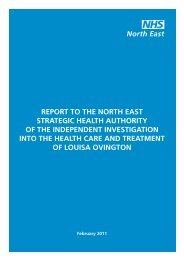REPORT OF AN INDEPENDENT INQUIRY ... - Hundred Families
REPORT OF AN INDEPENDENT INQUIRY ... - Hundred Families
REPORT OF AN INDEPENDENT INQUIRY ... - Hundred Families
You also want an ePaper? Increase the reach of your titles
YUMPU automatically turns print PDFs into web optimized ePapers that Google loves.
42<br />
9. The Metropolitan Police Service does not agree that there was any procedural reason for it to<br />
communicate with the Probation Service. The police say that Chandran Sukumaran was not in<br />
breach of the Community Punishment and Rehabilitation Order made on 12th June 2001.<br />
Further, they point out that there is evidence that the family did not want to get Chandran into<br />
trouble, and that involving his probation officer might have been perceived as doing just that. The<br />
letter handed to the police contained a request that “this report has to be confidential”.<br />
10. Caroline Godleman said that if somebody at Newham Council had been contacted, she would<br />
have expected that person then to make contact with the Community Mental Health Team<br />
(CMHT). She has duty staff available including a clinical medical officer (Section 12 approved),<br />
approved social worker and a nurse.<br />
11. Caroline Godleman was keen to emphasize to the Inquiry Panel that she considers there to be<br />
good links between the Trust and the police. She told us the Trust works closely with the Public<br />
Protection Unit and the Domestic Violence Unit and has regular mental health liaison meetings.<br />
12. We accept significant effort has been put into working towards an integrated service, particularly<br />
at a senior level. However the fact remains that, on this occasion, there was no contact with either<br />
the Emergency Duty Team or the Domestic Violence Unit nor was there recourse to the Adult<br />
Protection Procedures.<br />
Comment<br />
(1) In this case, we know that the police did not themselves forward information about the<br />
family’s concerns on to any other agency. We do not know, in the absence of having been<br />
able to talk to the relevant officer, the precise nature of the information he elicited from<br />
the family about Chandran’s behaviour and illness and the nature of any judgment he<br />
formed based on that information. Any attempt to form a view as to his opinion would<br />
be no more than speculation. However, we take the view that information that a person<br />
with mental health problems is not taking his medication and at times becomes violent<br />
or threatening (all of which was in the letter handed to the police) is such that the police<br />
should have referred the matter to the mental health services, whether by direct contact<br />
with the CMHT or the Domestic Violence Unit, or had recourse to Adult Protection<br />
Procedures.<br />
(2) We believe this would have been the right course of action but, at the least, it seems to<br />
us that the police ought to have provided relevant contact details to the family if they<br />
were to be left to get in touch with the mental health services themselves, or ensured that<br />
the family fully understood how to gain help for Chandran.<br />
(3) Had the police taken appropriate steps, it is likely the CMHT would have been contacted<br />
either directly or indirectly, and Caroline Godleman told us that there would then have<br />
been a CMHT response. The CMHT’s response would have included talking to<br />
Chandran’s family and a member of the team would have been sent out to do an<br />
assessment. The CMHT would have picked up the duty to do an assessment.

















